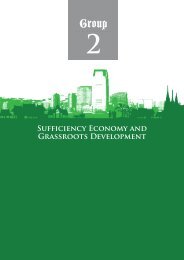Conflict, Legitimacy and Government Reform: Equitable Allocation of ...
Conflict, Legitimacy and Government Reform: Equitable Allocation of ...
Conflict, Legitimacy and Government Reform: Equitable Allocation of ...
Create successful ePaper yourself
Turn your PDF publications into a flip-book with our unique Google optimized e-Paper software.
82 KPI Congress XI<br />
Project Citizen was designed initially to respond to a perceived need<br />
for greater knowledge <strong>of</strong> local government in the United States. It also<br />
reflected a concern that by focusing on national governmental<br />
institutions other curricula ignored the decentralized nature <strong>of</strong> American<br />
society <strong>and</strong> governmental authority. Students needed to underst<strong>and</strong> their<br />
local governments better <strong>and</strong> to develop the skills necessary to interact<br />
with local authorities.<br />
For a program that was developed initially for an American context,<br />
Project Citizen has proven remarkably adaptable to other cultures. It has<br />
been introduced as a curriculum to some 70 countries <strong>and</strong> is being<br />
actively implemented in more than 60 on every inhabited continent.<br />
Although it flourishes in fully democratic societies, it has been adopted<br />
<strong>and</strong> is being used in many “hybrid” societies in which authoritarian<br />
governmental institutions <strong>and</strong> political cultures coexist with<br />
modernizing <strong>and</strong> reformist structures.<br />
Foundations <strong>of</strong> Democracy is a K-12 curricular program based on<br />
concepts fundamental to an underst<strong>and</strong>ing <strong>of</strong> politics <strong>and</strong> government,<br />
such as authority, privacy, responsibility, <strong>and</strong> justice. This multidisciplinary<br />
program draws upon such fields as political philosophy,<br />
political science, law, history, literature, <strong>and</strong> environmental studies to<br />
promote underst<strong>and</strong>ing, civic competence <strong>and</strong> responsible democratic<br />
citizenship.<br />
The Authority curriculum helps students (1) distinguish between<br />
authority <strong>and</strong> power, (2) examine different sources <strong>of</strong> authority,<br />
(3) use reasonable criteria for selecting people for positions <strong>of</strong><br />
authority <strong>and</strong> for evaluating rules <strong>and</strong> laws, (4) analyze the<br />
benefits <strong>and</strong> costs <strong>of</strong> authority, <strong>and</strong> (5) evaluate, take, <strong>and</strong> defend<br />
positions on the proper scope <strong>and</strong> limits <strong>of</strong> authority.<br />
The Privacy curriculum helps students (1) underst<strong>and</strong> the<br />
importance <strong>of</strong> privacy in a free society, (2) analyze the benefits<br />
<strong>and</strong> costs <strong>of</strong> privacy, <strong>and</strong> (3) evaluate, take, <strong>and</strong> defend positions<br />
on the proper scope <strong>and</strong> limits <strong>of</strong> privacy.














